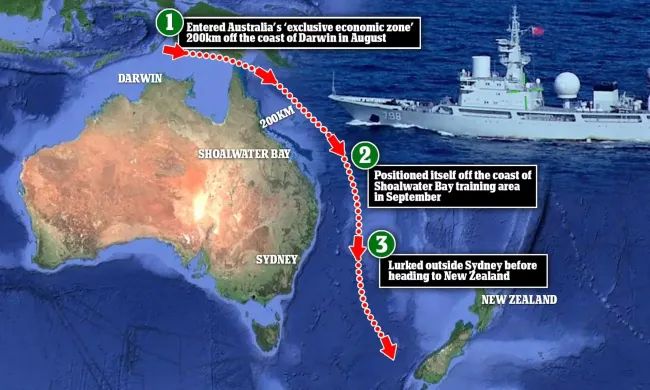Chinese Spy Ship Brazenly Creeps Near Australia’s West Coast, Provoking Warship Shadowing
The Indo-Pacific powder keg just got another spark. A Chinese surveillance vessel dared to prowl alarmingly close to Australia’s west coast, in a calculated move near a top-secret naval communications base. Australian Defence Minister Peter Dutton slammed the act as “aggressive and provocative,” sounding the alarm on Beijing’s audacious power play in the region.
The Incident
China’s Haiwangxing, a Dongdiao-class intelligence ship, didn’t just skim the edges of Australian waters—it intruded dangerously close to the Harold E. Holt naval communications station in Exmouth, Western Australia. This base, critical for U.S. and allied submarine operations, became the unwilling focal point of Beijing’s intelligence-gathering mission.
What’s more, the Haiwangxing ventured farther south along Australia’s coast than any Chinese vessel before, signaling an alarming escalation. Dutton minced no words, calling the ship’s maneuver a clear bid to “spy” on Australia’s military and strategic strongholds.
Australia’s Response
Australian forces sprang into action, deploying aerial and maritime surveillance to shadow the intruding vessel. Dutton labeled the move “unprecedented” and blasted it as an aggressive escalation in Beijing’s growing surveillance footprint.
While Prime Minister Scott Morrison acknowledged that the ship technically stayed within international waters, he made it clear that such behavior wouldn’t go unnoticed. Australia, he vowed, would remain on high alert to counter any encroachment on its sovereignty.
Broader Implications
This isn’t an isolated incident—it’s part of a disturbing pattern. Chinese spy ships have repeatedly appeared near sensitive zones, including during major military exercises like Talisman Sabre, where Australia and its allies showcase their strategic muscle.
The Haiwangxing’s brazen mission is a chilling reminder of China’s relentless bid to gather intelligence on allied capabilities, particularly in submarine warfare and communications. It’s not just surveillance—it’s a strategic chess move in the intensifying Indo-Pacific rivalry.
Political and Diplomatic Firestorm
The timing couldn’t be more suspicious. Just days before Australia’s federal election, the incident has sparked fiery political debates. Dutton dismissed claims of political opportunism, insisting that the public deserved to know about such blatant threats.
China, of course, denied everything. Foreign Ministry spokesperson Zhao Lijian brushed off the allegations, calling for calm and accusing Australian politicians of “hyping” the situation. But Beijing’s denials are unlikely to quell growing regional unease.
Conclusion
The Haiwangxing’s provocative intrusion isn’t just a one-off—it’s a wake-up call. As China flexes its muscles in the Indo-Pacific, Australia and its allies face mounting pressure to respond decisively.
This bold act of espionage underscores the stakes of the unfolding geopolitical chess match. For Australia, vigilance and transparency are non-negotiable. The question now is how far Beijing is willing to push—and how prepared Australia is to push back.
